This week SRM announced their latest power meter, EXAKT. But unlike every previous bike-mountable power meter they’ve made, this one isn’t crankset based. Instead, it ventures into new ground for them: The pedal. The company has partnered with LOOK to create a pedal-based power meter that does away with the pods of previous LOOK power meter designs, all while broadcasting on both ANT+ & Bluetooth Smart (something existing SRM power meters don’t do).
And even more? It’s technically SRM’s least expensive power meter to date. Which doesn’t mean it’s cheap – at 1399EUR/$1,200-$1,300USD*, it’s still the most expensive pedal-based power meter on the market (by a long shot). Though, you can save about half that cost if you only want half a power meter. The company is offering a single-sided version for 799EUR. Choices folks, it’s all about choices (like everyone else).
With the launch yesterday, I spent time talking with numerous SRM and LOOK engineers and their respective CEO’s about the units, as well as heading out for not one, but two rides on the new pedals. One of which has comparative data against a secondary power meter.
Note that this isn’t a review. It’s merely an early look. My in-depth reviews have numerous rides in numerous conditions against numerous power meters. This is just a quick look at things until I have my own set of pedals that I can throw the gauntlet at.
So with that, let’s dive into all the details.
*Specifics of the USD pricing is being sorted out as they finalize some of the US import duties they need to pay (the pedal is built in France/Germany). They hope to have that number shortly, but they state the USD range for the dual set will be between $1,200-$1,300USD.
The Details:
When discussing the SRM EXAKT, it’s likely best to start with the partnership aspect. The pedal is the child of two parents – SRM and LOOK. Both companies have fairly equal responsibility for it. The production starts with LOOK, in their factories in France, where the carbon pedal bodies are made. The pedal body is almost identical to that of their existing Blade product, though I’m told the stack height is just a tiny bit higher at 11.9mm (I didn’t get a chance to validate that with a measuring device though). The Q-Factor comes in at 54.6mm.
Once the pedal body is made, it’s shipped across the border to SRM in Germany. It’s there that the SRM-manufactured steel spindles are placed within the body of the pedals. These spindles are where power meter ‘goods’ are, including the four strain gauges per pedal in a fairly traditional Wheatstone bridge design. The spindles do not use an accelerometer for cadence, but rather a small magnet you can see on the exterior of the pedal body.
This magnet rotates past the spindle, allowing them to track its precise location (more on that aspect in a moment). In theory, this also reduces accelerometer driven accuracy issues that used to be an issue in the power meter industry (but realistically, aren’t an issue in 2018).
The pedal body and spindle can be replaced. While the operation isn’t technically difficult, it’s something that SRM/LOOK will likely limit to their dealers for now. It simply requires opening that little blue cap you see below and swapping out the spindle inside.
When it comes to support, SRM and LOOK have bonded together a dedicated support front-end that customers will interface via online support. That entity will then farm the request out to the appropriate company office for the country/region the user is calling from. For example, if the person is in France, then they’ll be handled via the LOOK France offices. Whereas if the user is in the US, they’ll be forwarded to SRM’s Colorado offices. In both cases though, to the end customer, it’ll appear as a single cohesive entity. Only behind the scenes are they dividing up the labor/handling.
In any case – back to manufacturing. After the pedal body is inserted into the unit and tested by SRM in Germany, the pedals are shipped back across the border to France, where LOOK packages them up in a pretty box.
You’ve got three choices for your purchase acquisition, they are:
EXAKT DUAL + SRM PC8: Dual-sided power meter pedal sets with SRM PC8 head unit (2,179EUR)
EXAKT Dual: Dual-sided power meter pedal sets (1,399EUR)
EXAKT Single: Single-sided power meter pedal, with a matching ‘empty’ pedal (799EUR)
Float-wise the options at 0°, 4.5°, and 9°.
All of which will start being available as of July 1st for shipping. Looking at the build quality and readiness of the units at the event yesterday, this seems rather achievable. I would imagine the only thing that would interrupt this date is a manufacturing related issue (e.g. supplies/etc…), but everyone seems confident of July 1st, albeit in limited quantities.
The completed pedal body is IPX7 waterproof (30 minutes at 1-meter), similar to most other power meters in the industry. It claims an official weight of 155g per pedal, inclusive of the stainless steel contact surface inlaid into the pedal body. In my case, I weighed them in at slightly more than that. Perhaps my scale is wrong, perhaps this unit isn’t quite final, or perhaps people just like round numbers. Most of us won’t notice that gram or so one way or another.
When it comes to mounting the EXAKT, they do take a bit of a step back from where other units have gone. The EXAKT pedal (in theory) requires you to use the special mounting tool, which holds in place the spindle while you tighten the nut down. This is similar in design to the previous LOOK/Polar and stand-alone Look pedals.
In practice though, if you use the smartphone app in conjunction with a standard Allen wrench, you can achieve the same thing. That’s because the pedal has a small blue mark on it to assist with alignment, and then from there the mobile app to ensure you keep it within the ‘green’ zone gauge. Within that zone is within 1% of claimed spec, yellow is 1-1.5%, and red is playing with fire. All of this is trivial and most SRM/Look employees noted they rarely use the tool and just use the app to double-check it.
That app also allows you to check stats about the pedal such as firmware and offset. Speaking of offset, you can enable/disable the auto-zero if you’d like to, though SRM says there’s no reason to. It’s fire and forget from their perspective. Once you’ve got your unit in the green zone on the app, they say you should just be able to ride without any zero offset or calibration procedures, every time.
The app also has a high-speed data transmission mode via Bluetooth Smart, at 200hz, so 200 times per second. As of now though, that data isn’t recorded, but only displayed for viewing live. They’re looking at user feedback to see if there’s any demand for recording that data (Stages does something similar, and I’ve yet to hear of many people actually using that in real-life…mostly just woulda/coulda type statements).
Once you’re ready to ride you’ll pair it up to your head unit via either ANT+ or Bluetooth Smart. Both are supported concurrently. I paired it successfully to the SRM PC8 (duh), as well as to a Garmin Edge 520 Plus, a Garmin Fenix 5, and then another bike computer. All without issue (and the data from all matched).
Interestingly, SRM has a trick up their sleeve on the Bluetooth Smart side. They’ve got a ‘Zwift Compatibility mode’ (for Bluetooth Smart). That’s because on Bluetooth Smart, Zwift is unable to pair to the left/right pedal concurrently. So for the PowerTap P1 and Favero Assioma pedals, you have to choose either the left only or right only pedal, effectively rendering your expensive dual-purchase no different than a single-sided power meter that cost half as much (for half the data).
With EXAKT and the Zwift compatibility mode, it enumerates as a single cohesive unit with total power already calculated properly between the two pedals. This is roughly in line with what Garmin does for Vector 3 as well. This function would also be useful for Suunto watches, which do not properly support dual-broadcasting left/right pedal based systems either.
From an ANT+ standpoint, the unit also broadcasts power balance, ANT+ pedal balance, ANT+ pedal smoothness, and ANT+ torque effectiveness. It doesn’t broadcast ANT+ Cycling Dynamics, largely because at this stage that specification is still held up in the Technical Working Group (mostly through fault of the power meter companies themselves dragging their feet on approving it). Here’s a link to a Garmin Connect activity recorded on an Edge 520 Plus showing all the data you’d get during a ride:
And for those who want to download my ride file data, see the accuracy bits down below. The company claims a +/- 1.5% accuracy level for the dual-sided EXAKT. For single-sided, the claim is the same, but only of the measured leg (right). In SRM’s system, the right pedal is the master. If the right pedal is lost, the system is unavailable. If the left side is lost, the right side will automatically compensate and double the power of the right side to keep you in the game.
On the accuracy front, the unit uses both passive and active temperature compensation, which is a bit different than SRM crank-based power meters that lack that active compensation component. That’ll help the company better track temperature shifts over long sustained climbs with shifting temperatures where you never stop pedaling (such as climbing Alpe d’Huez…Alpe d’Zwift need not apply).
The company says they’re looking to add both the active temperature compensation (which requires new hardware) and Bluetooth Smart support to their crankset lineup likely later this year.
When it comes to battery life, the unit claims 100 hours per charge, which takes about 5 hours to charge. The unit comes with a small charging adapter that plugs into the side of the spindle, and connects via micro-USB cable (the pedal itself doesn’t have a micro-USB port, just the bite-sized charging adapter).
Finally, for lack of anywhere else to stash it, the product has a two-year warranty (globally), and the firmware can be updated via mobile app over Bluetooth Smart. Also, you can do a static weight calibration validation.
A Test Ride:
Technically, I did two test rides as part of the media event they had. But only one of them was data-wise useful. The first ride I did was about an hour or so riding the pedals on a provided bike, but without any other power meter reference. While that type of ride is fine for spotting obvious issues (such as a dropout, unrealistic power numbers, or issues with rough roads), it doesn’t tell me anything meaningful from a power accuracy standpoint.
Nobody can, without context out on an open rolling road inside a group ride, tell the difference between riding for 20 seconds at 232w and 248w. And that’s the kind of difference you’d need to know exists. So while that ride was nice and fun, it was largely superficial.
So instead, I do what I do best: Steal other peoples bikes, preferably more expensive bikes.
Since this particular 3-day and 6 city trip was too complex to take a bike with me, I didn’t have my full test setup. So instead I borrowed a different bike from SRM that was equipped with both an SRM crankset-based power meter, as well as the new SRM EXAKT pedals. It also happened to be the CEO’s bike, so chances were pretty good it’d work. But still, I’ve ‘broken’ plenty of supposedly working power meters from CEO’s of power meter companies before. Adding another to my resume? No problem.
In any case…off I went:
Now I was technically recording the data on four sources. I recorded it on two SRM PC8 head units that were already mounted to the bike, and then I also recorded the data on an Edge 520 Plus and a Garmin Fenix 5. Backups of backups. For the charts below I ended up using the two data sets from the SRM PC8, though the pedal data matched spot-on from the Garmin too.
My route was roughly out and back, save for getting (purposefully of course) lost three times on the back part. I was trying to find rougher roads, as well as areas I could throw down a bit on power. Rougher roads turned out to be easy, many of the roads in that town aren’t exactly smooth. In fact, on the earlier ride, I misplaced the group (don’t ask) and ended up on a random very-rocky road. No issues with dropouts.
In any case, the data (you can dive into the Analyzer here, including downloading the original SRM PC8 .FIT files):
As you can see, it’s virtually identical. I need not do too much analysis here, because quite frankly they almost never diverge. About the only point you see any differences is during some sprints (I smoothed these graphs to 3-seconds), but even that is only 20w (on 800w). As anyone can attest, when looking at max power sprints, you’re virtually always likely to get a slight difference in the peak power due to transmission/recording timing differences.
A quick look at cadence is worthwhile too. Both units actually use magnets for cadence, though it appears the pedals may, in fact, do a better job of it than the crankset. You can see these brief moments here where I stopped pedaling, and the pedals catch it substantially quicker:
It also handled some 30-35RPM sections I did of low cadence as well without issue. This isn’t a surprise, but something I like to test, most other units handle down to about 18-20RPM fairly well.
The only area that’s worth some slight pause is the mean-max graph, which around the 30sec to 1min peak power shows a bit more divergence than the rest of the graph shows. It’s unclear to me where precisely this is coming from (perhaps I’ll load it into Trainer Road’s tool to do it), but it is about 15w (on 345w).
So at first glance, I’d say things look fairly good. But one thing I’d caution is that I didn’t get to test out temperature shift type scenarios here, or really have any more data than 30 seconds worth. A typical review takes about a month and has numerous rides across different scenarios. And more importantly: Has different branded power meters.
Like any other power meter on the market, all power meter brands have quirks. And when you’re comparing only two units from the same brand, it’s likely those quirks will manifest itself the same way on both units (since algorithms, assumptions, etc… are often shared). Thus in the above graphs I might not even see an issue since both units would have handled the issue the same way.
That’s why in my reviews I use 3-4 power meters, almost always from 3-4 different brands. Which, I’ll do in my full SRM EXAKT in-depth review a bit later this summer once they start shipping. So hang tight for that!
Ultimately, I’d say that given the limited 30-minute test, the accuracy performance on these pedals seems to match that of the other power meter pedals on the market. But, as those pedals can all attest too, it’s actually not accuracy that’s been the challenge for them. Rather, it’s durability and manufacturing related challenges that has caused most competitors their pain. And in those cases, it’s never been on day 1, but months later (many months in some cases). Still, things look positive here.
(Note: All of the charts in these accuracy portions were created using the DCR Analyzer tool. It allows you to compare power meters/trainers, heart rate, cadence, speed/pace, GPS tracks and plenty more. You can use it as well for your own gadget comparisons, more details here.)
Pedal Market Comparison:
Last fall upon the release of the Vector 3 and Assioma pedals, I stacked those two up against the existing PowerTap P1 pedals in a sprawling post with more details and specifics than I can throw a stick at. Or a lot of sticks. Seriously, it got out of control.
(Left to right: PowerTap P1, Favero Assioma, SRM EXAKT, Garmin Vector 3)
However, towards the end of that post I had a bit of simplified table that took all of the details of the umpteen sections and simplified it. So, in order to help compare some aspects, I’ve added the SRM EXAKT pedals to that table and placed it below. Note that there are some details I don’t have yet. For example, the cornering angle piece I did on a specific bike of mine with a specific crank length. Thus I wouldn’t be able to compare against using data from different bikes. So I’ll need to do all that from scratch once I get a final set of pedals.
| Function/Feature | SRM X-Power | Favero Assioma Power Meter Pedals (Dual) | Garmin Vector 3 | PowerTap P1 Pedals |
|---|---|---|---|---|
| Copyright DC Rainmaker - Updated November 28th, 2024 @ 2:32 pm New Window | ||||
| Price | $1,199 | $459/$719 (single/dual) | $999 | $679 |
| Available today | Yes | Global | Started shipping October 2017 | Global |
| Measurement Type | Direct Force | Direct Force | Direct Force | Direct Force |
| Attachment area | Pedal | Pedal | Pedals | Pedals |
| Attachment limitations | Shiman oSPD | LOOK KEO COMPATIBLE CLEATS ONLY | LOOK KEO COMPATIBLE CLEATS ONLY | Look Keo variant cleats only |
| Weight (additional/net) | 172g per pedal | 150g per pedal (inclusive of pods) | 161g per pedal | 216g per pedal |
| Wireless Connectivity Type | ANT+/Bluetooth Smart | ANT+/BLUETOOTH SMART (DUAL) | ANT+/Bluetooth Smart | ANT+/Bluetooth Smart (Dual) |
| Unit auto-turns on when on bike | Yes | Yes | Yes | Yes | Battery | SRM X-Power | Favero Assioma Power Meter Pedals (Dual) | Garmin Vector 3 | PowerTap P1 Pedals |
| Battery Life | 30ish hours | 50 Hours | 120-150 hours | 60hrs+ |
| User or Factory battery replacement | Factory (support issue only) | FACTORY (SUPPORT ISSUE ONLY) | User | User |
| Battery type | Recharageable | Rechargeable | LR44 | AAA |
| Low Battery Warning | Yes | Yes | Yes | Yes | Features | SRM X-Power | Favero Assioma Power Meter Pedals (Dual) | Garmin Vector 3 | PowerTap P1 Pedals |
| Measures/Transmits Cadence | Yes | Yes | Yes | YEs |
| Ability to update firmware | Yes | Yes | Yes | Yes |
| Transmits Left/Right Power Balance (Measured) | Yes | Yes | Yes | Yes |
| Transmits Pedal Smoothness | Yes | Yes | Yes | Yes | Accuracy | SRM X-Power | Favero Assioma Power Meter Pedals (Dual) | Garmin Vector 3 | PowerTap P1 Pedals |
| Measures all power output | Yes | Yes | Yes | Yes |
| Claimed Accuracy Level | +/- 1.5% | +/- 1% | +/- 1% | +/- 1.5% |
| Includes temperature compensation | Yes | Yes | Yes | Yes |
| Supports auto-zero function | Yes | Yes | Yes | YEs |
| Supports manual calibration | Yes | Yes | Yes | Yes |
| Supports hanging weights (static test) | Yes | Yes | Yes | No | Software | SRM X-Power | Favero Assioma Power Meter Pedals (Dual) | Garmin Vector 3 | PowerTap P1 Pedals |
| Phone App to Configure/Test | Yes | Yes | Yes | Yes | Purchase | SRM X-Power | Favero Assioma Power Meter Pedals (Dual) | Garmin Vector 3 | PowerTap P1 Pedals |
| Amazon | Link | Link | Link | |
| Backcountry.com | Link | |||
| Competitive Cyclist | Link | |||
| REI | Link | DCRainmaker | SRM X-Power | Favero Assioma Power Meter Pedals (Dual) | Garmin Vector 3 | PowerTap P1 Pedals |
| Review Link | Link | Link | Link | Link |
As for a non-data driven comparison, I’ll largely wait until the review for that. I suspect for the most part, like before, it’s going to come down to a specific nuance/detail of one unit or another. I suspect that we will find the accuracy to be on-par with the other units in the market (which is to say, they’re all good). With that being equal, I’d probably guess you could summarize the downsides in the most distilled manner as possible:
Favero Assioma Downside: Pod design is not as aesthetically pleasing
Garmin Vector 3: Battery cap/pod fiasco, availability constraints
PowerTap P1: A bit of a chunker, needs a diet
SRM EXAKT: Expensive (and yet unproven over time), imperfect mounting
But again, more details in my full review. I’ll also likely release a new version of that previous comparison post, with the EXAKT in there, and in the highly unlikely chance anything else pedal-wise comes out of Eurobike, that too.
Wrap-Up:
Overall SRM and LOOK have put together a really nice looking power meter pedal from an exterior standpoint, and one that at first glance appears to be producing accurate data across a small bevy of tests. Certainly both companies are well-known for the quality of their products, and in this case – the timelines are merely four weeks away for units to start shipping (though, it sounds like quantities will be highly limited at first).
Obviously the price will be a sticking point for many, though the company did concede that they’ll be paying attention to consumer feedback in this area. They also noted they are aware they are entering a market with already existing products that they themselves noted were largely accurate.
The only concern I had going into the event was how the dual-partnership would handle support for customers, and after a long discussion about it with the CEO of LOOK, I’m more confident they’ve learned from the failures of their support of power meter pedals in the previous LOOK/Polar partnership. Of course, the proof will be in the pudding over time, but they’ve put processes in place to ensure people aren’t falling through the cracks like before.
With that – stay tuned for my full in-depth review later this summer, probably sometime in July, assuming I get a final pair here shortly.
Thanks for reading – and feel free to drop any questions below as always.
(Also note for lack of anywhere else to state it, I paid all my own travel to the event and I do not accept advertising or anything else from SRM or any other product that I review.)

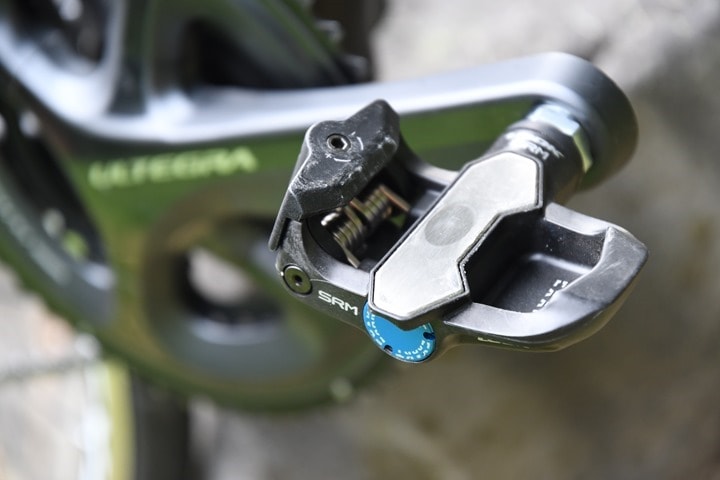
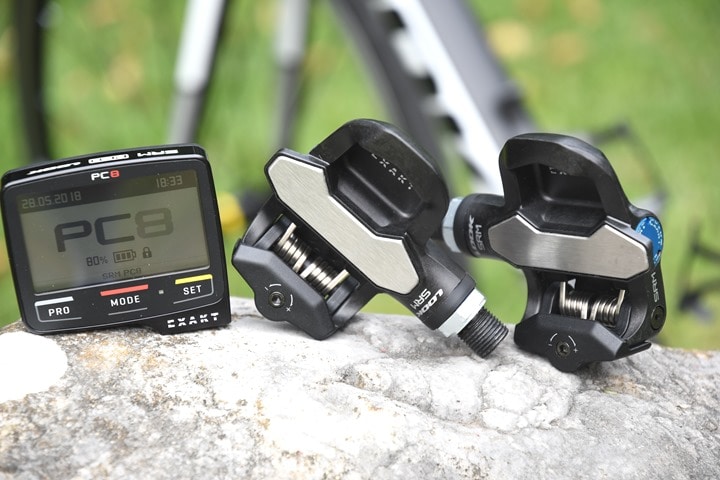
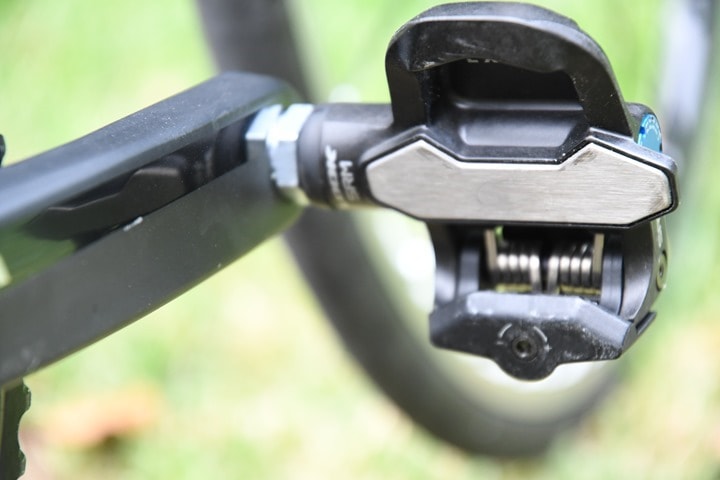
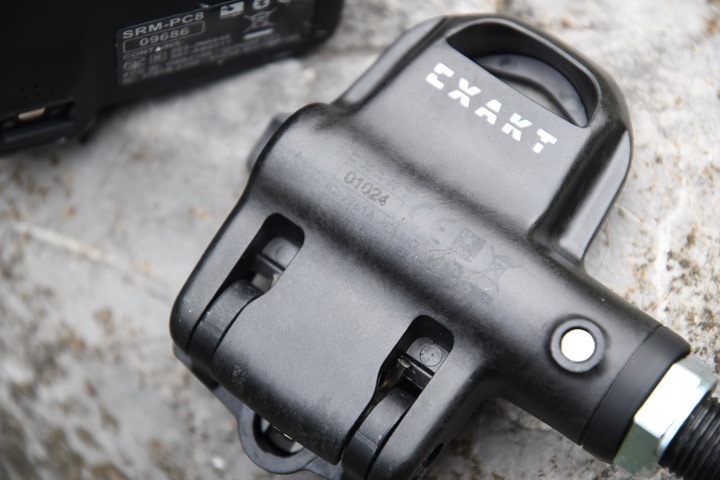
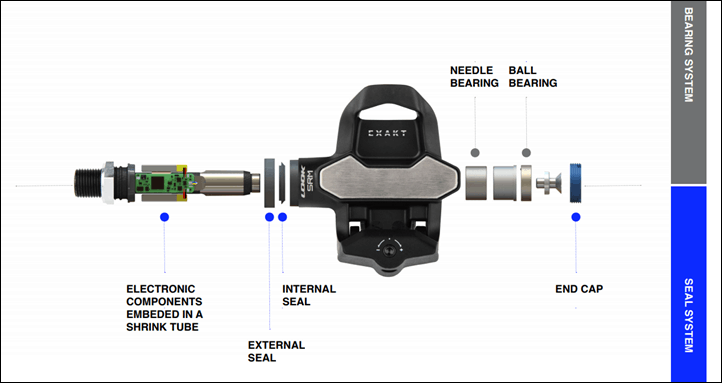
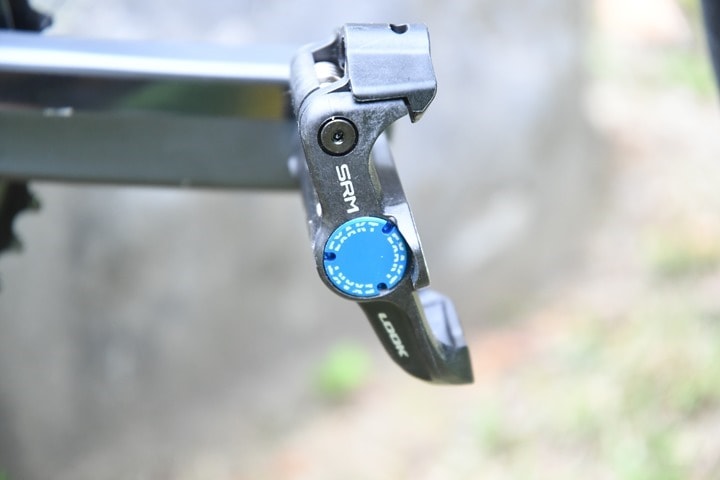
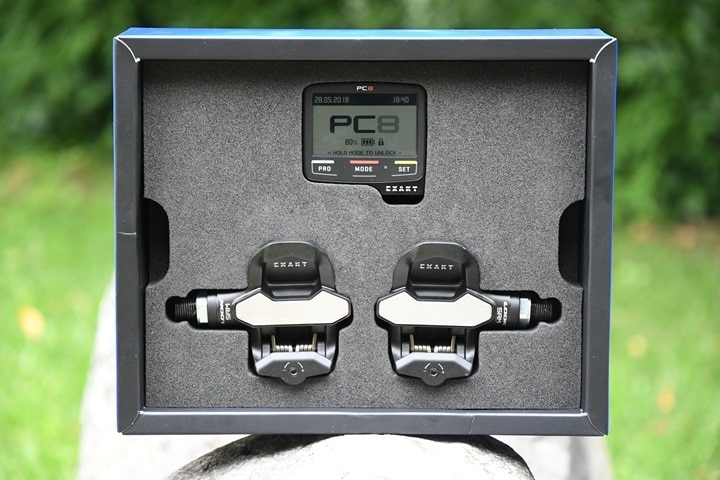
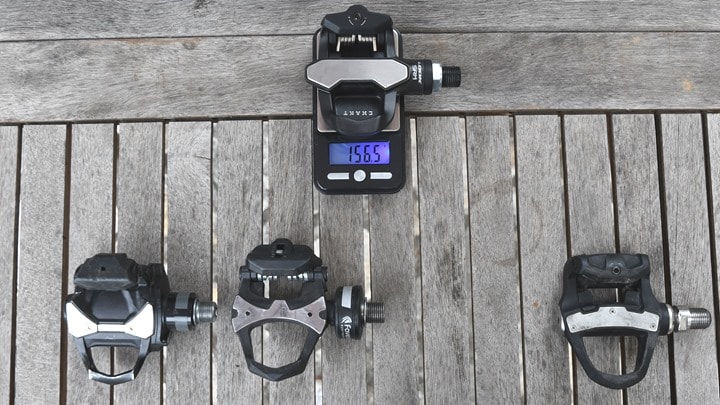
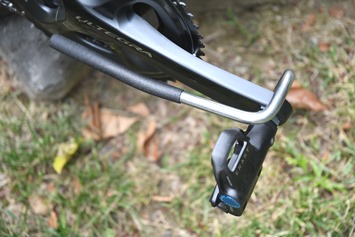
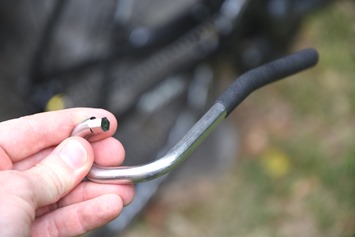
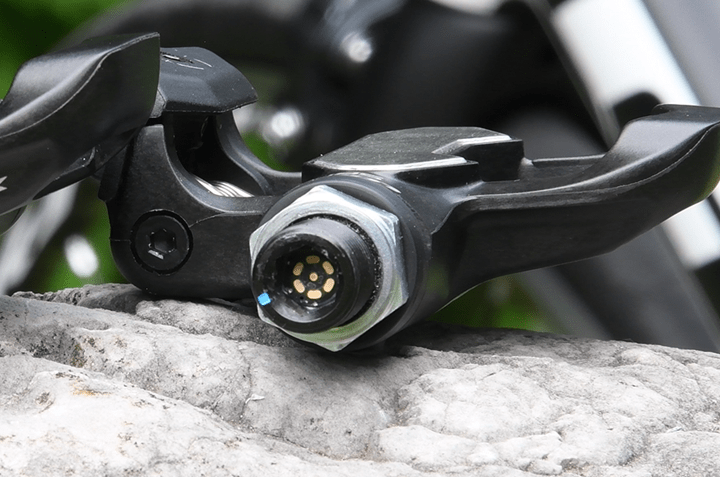
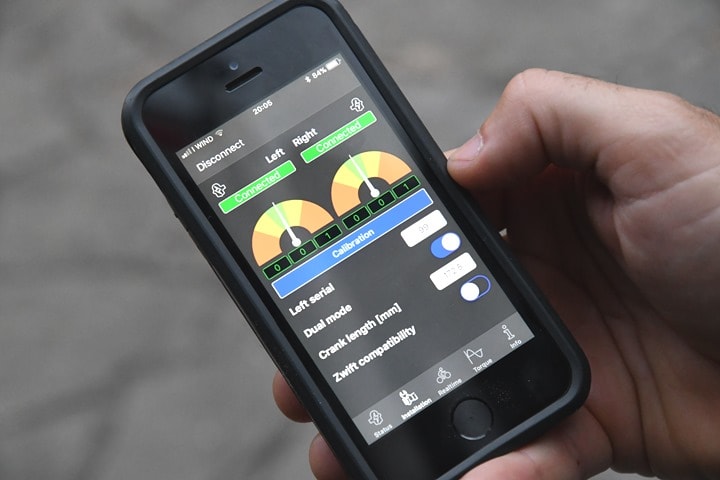
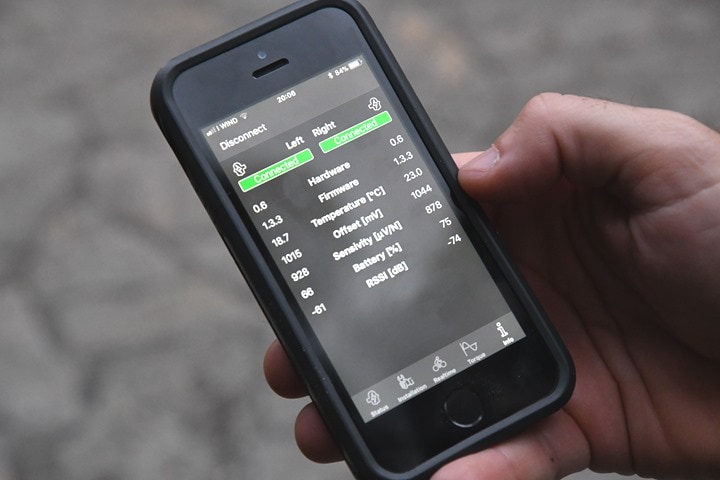
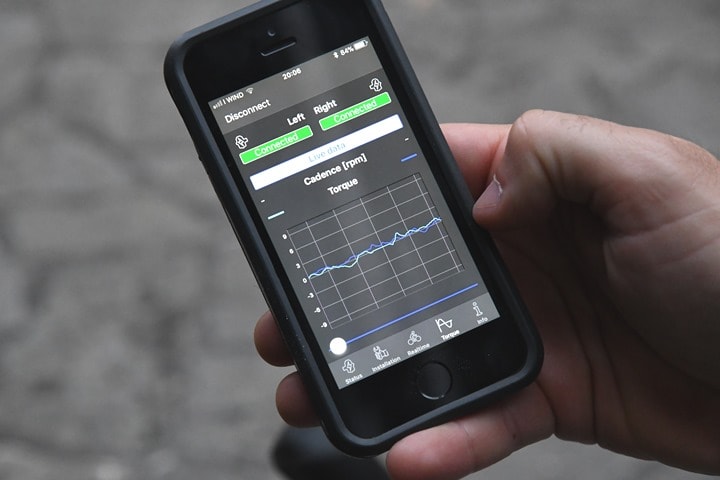
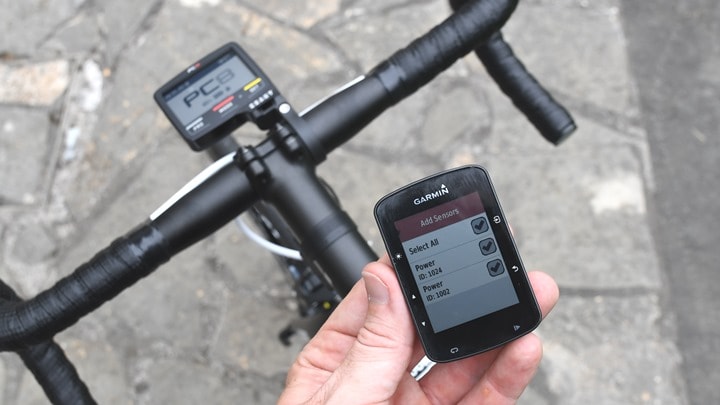
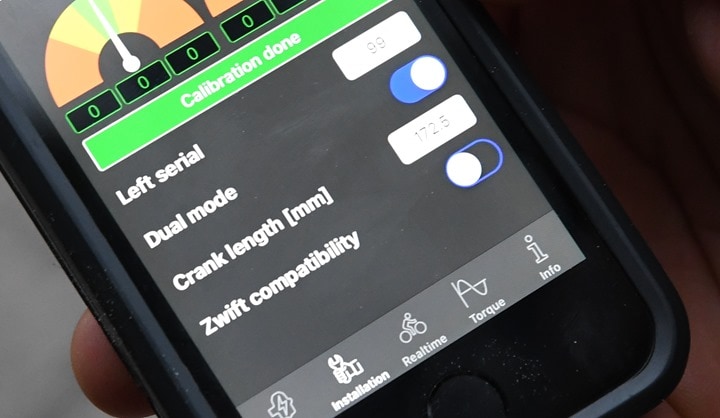
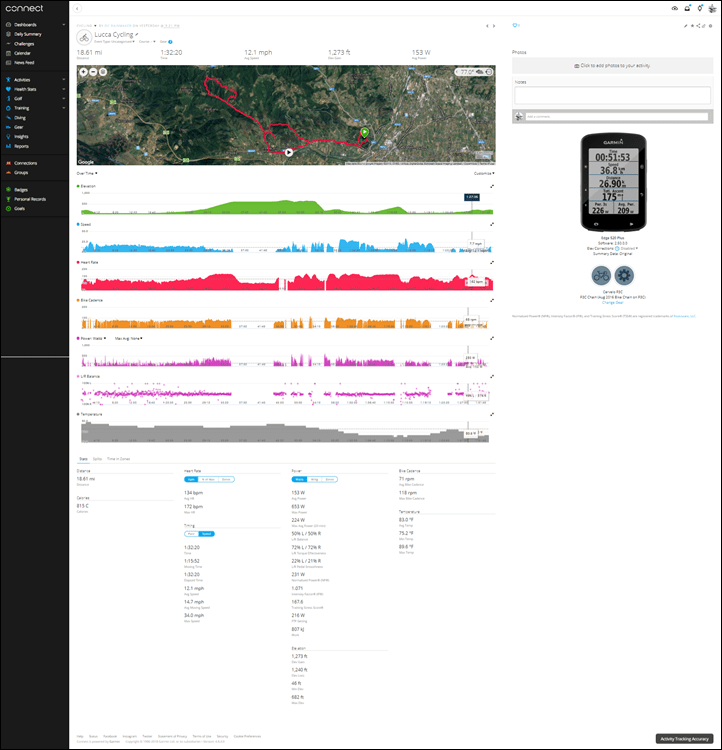
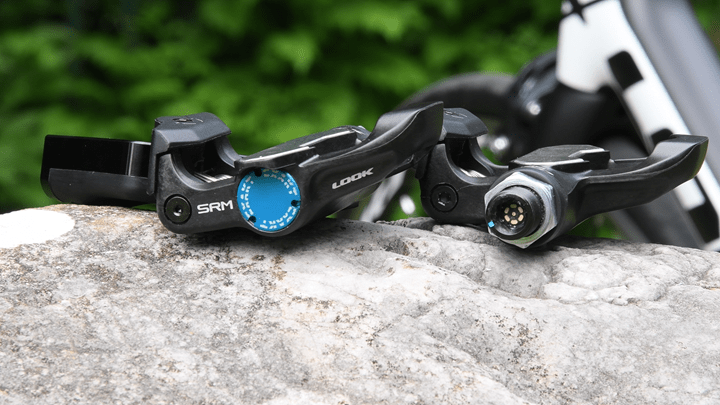
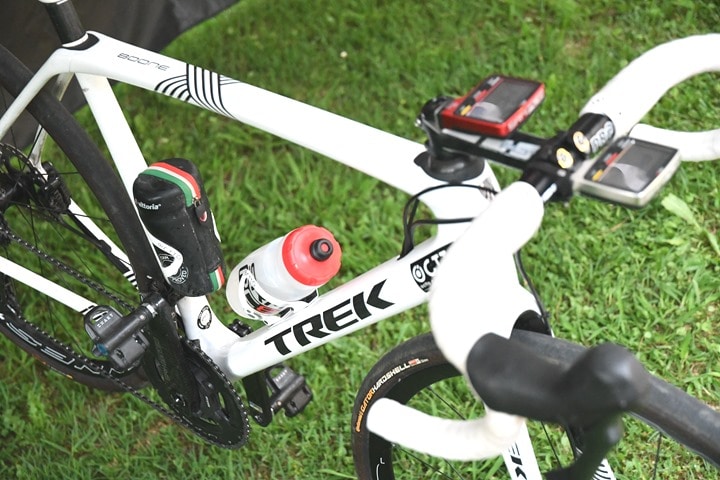




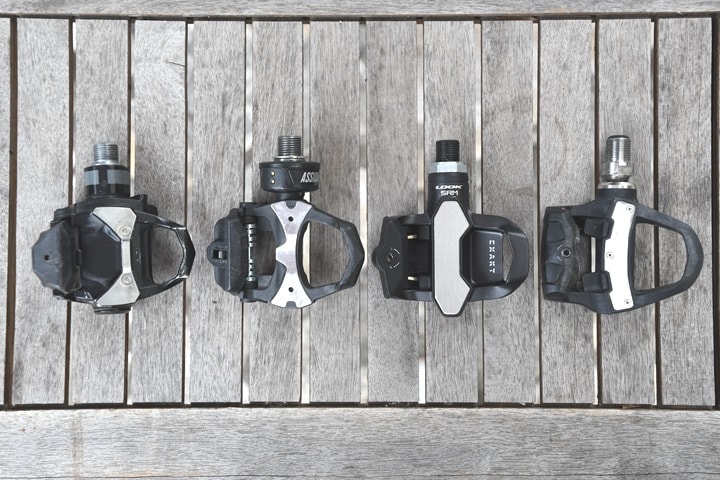

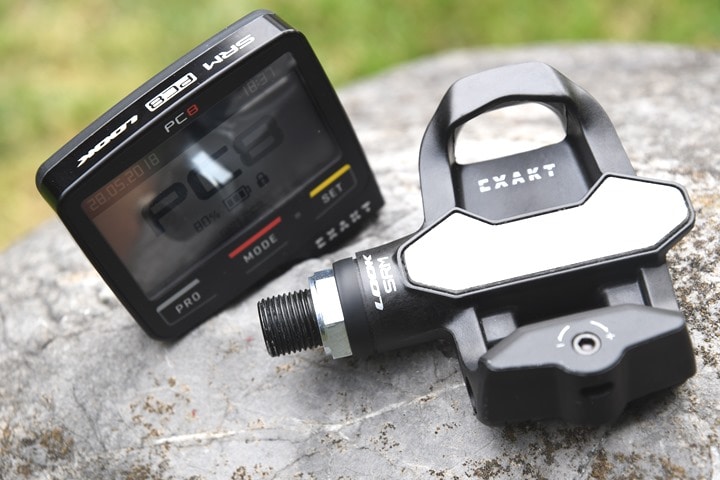





















I really like the look of these… but how much ? “though the company did concede that they’ll be paying attention to consumer feedback in this area”… seriously… do they really need telling it is too expensive ! the market trend is lower pricing and they come in with something higher that has no obvious advantages over cheaper rivals.
I’d like to know what claims SRM make to justify the extra cost. It’s certainly not immediately obvious.
Edit: the Assioma are since firmware 2.00 with an error margin on +/- 1%. Not 2% as you write in the table…
Thanks, database tweaked!
“Supports hanging weights (static test)” – positive the bePRO can do that…and reasonably sure the ASSIOMA can.
So the bePro lists a procedure in their manual labeled that…but it’s actually not that. :)
Typically with a static hanging weight test, you’d get back a value from the screen related to the weight to validate.
In the case of Favero, it’s just a standard zero offset. I haven’t seen anything for Assioma. Happy to be wrong, but the last time someone mentioned this I dug around a bit and confirmed what I thought. Plus, usually Favero is pretty good at finding any typos I make, and this one has been listed since last summer as-is on all power meter product comparison tables. :)
I was referring to the link below – as you say probably not quite the same but it involves staticness, testyness and hanging weights…hence my confusion ;-)
document: 0259-0980 Troubleshooting bePRO-1.pdf
Section: 2.12. Verification of the static torque
this url might not work: link to google.com
Interesting…that actually is a valid procedure (specifically section 2.12), whereas the ‘new’/current manual doesn’t have that.
I wonder if they pulled it (it seems overly complicated for what should be relatively simple) in more current firmware? As the linked manual is from the ‘old’ section of the site.
Interesting…will have to poke them and ask what’s up.
It’s still in the current firmware, they simply removed the procedure from the user manual and put it in the troubleshooting manual.. A manual that is a bit buried in the support pages…
But they will email it to you if you complain to them about power accuracy.
I have the bepro pedals with current firmware and I do this test every time I move the pedals ( after a few days of use).
Favero saw our discussion and e-mailed. In the next software version of the app they’ll be introducing a static weight test section that mirrors what most other manufs have. Good deal there.
Also, they’re working on a Zwift compatibility mode as well.
Both are slated for later this summer.
hi, yes i don’t think the bePRO procedure was EVER in the ‘manual’ (@Fabrizio???), i think it was always in the separate troubleshooting guide (as above, it was there pre-ASSIOMA I remember using it). it doesn’t really matter i suppose.
my mistake with the assioma it is in the beta firmware aka “Test Con Peso Statico” and you do the dangling dance with a weight of your choice via the interface, which i think is a bit nicer than doing the calcs separately to the app even tho the maths is simple.
Here’s hoping you do a review on the IQ2 powermeters coming out of the Netherlands. If this thing works as advertised, it will blow the power meter market to shreds. Was sent a link to this a while back and just checked again and they are shipping.
I’ll be waiting for the review…and since you moved there, it should be on your radar.
john
IQ2 Post here: link to dcrainmaker.com
Note: They aren’t shipping until the fall (in a best case theory kinda way).
I think the static torque test procedure for the bepro was in the very first manual (before they changed the dynamic calibration procedure), but I may be mistaken.
And I agree – SRM has absotely nothing but higher price to add. I will definitely NOT swap my Assioma Duo’s. Also because they just work so damn well – every time!
“Battery cap/pod fiasco”
Any details of this issue with the garmin vector3s ray?
It’s a slaughterhouse of detail over on the official Garmin Forums. link to forums.garmin.com Hoping to get my hands on the replacement caps/doors for my V3 to smooth out the dramas.
One thing that’s also an issue at the moment is battery life. 30-40 hours.
@Shane: how much did you get / are getting?
It seems like the battery duration is largely tied to both the batteries selected, and also to the battery caps (if they rub/gap, then you end up getting less time as well).
I think my V3 battery lasts as long as Garmin say it does. The problem is that you have to play chicken with the battery alerts to get there. I was in Lanzarote (so warm enough that temp didn’t cause it) and got a low battery warning. This was after probably 25 hours use. I ignored it since I only had one more small ride and was worried about opening the battery cover. No issues at all and battery was reported as fine on the next ride and since.
I later changed the batteries when I got home since I have loads of them so no idea how long they’d have gone on for but probably 50 hours doesn’t seem unreasonable. I didn’t have any apparent issues with the battery covers either. Perhaps I got lucky but mine were a very early batch so definitely within the problem period.
It’s not like me to defend Garmin on here, but in the case of the Vectors I’m not yet unhappy. I am holding off on the new firmware though, so many complaints!
Any ideas if the new units have the issue (Theoretically) fixed, hence the delay? I know we won’t know for sure till few months pass.. I’m about to receive mine any day now from the latest bach clever training received after +1month delay I would like to not have to exchange them from the get-go..
I would have gotten the Duos for the cheaper price and no delay if I wasn’t going to use them a lot with BLE Apps (so, only half of the real power data available…)
Also interested in these problems, I have been holding up off upgrading my Vector 2 to get Bluetooth compatibility and no pods to move when swapping between bikes.
These do look nice but the price is out for me. I would also miss the the cycling dynamics but that sounds like matter of when not if.
It would be nice if Strava got their act together, and added batteries (PM, eTAP/di2/EPS, HRM, e-bike etc) in their gear tracking. Both replacement and recharge. Would make it easy to track how long they last, so one can find the ones with best lifetime…
Pretty $$$.
I think it would be interesting to see a relative ranking of “comments” for various single product reviews, then correlate this to the product’s price point in their general product category, and ultimately to the market share.
Hypothesis: DCR “comments” volume is a sales predictor.
Based on everything I see, in almost all cases your hypothesis is correct (unless the comments are negative, such as the overwhelming disapproval of the Kinetic Smart Control a few summers back, which totally tanked sales).
Of course, there’s also some element of my audience makeup. If you went by comments alone, the Apple Watch review would have 3-5x that of the Fenix 5 review. It doesn’t. But that even gets into the types of purchasers of such devices. I find in general that while my Fitbit reviews often out-rank in views my Garmin reviews, they don’t attract the same comment volume.
Another look pedal powermeter. The most expensive without any advantages. Really? Why nobody makes spd sl or speedplay pedal powermeter?
Licensing issue. It would need to be Shimano or Speedplay themselves doing such power meter.
And why not TIME iClick compatible powermeters! Always LOOK. LOOK, LOOK, LOOK… I have Time pedals in all my bikes. I dont want LOOK stuff. I want TIME stuff! :/
Ray, do you have any hope that an SPD style pedal power meter system will be coming out anytime soon? Is there some technical problem with doing so? It seems to me that the first company which did so would gain a large market share.
I’d be curious about this as well. Though something more generically ‘mountain-bike’ style would be better as I am a Crank Brothers user. The iQ^2 looks promising but I’m not holding my breath.
nick
Something may have changed but a few years ago I think the issue was simply a matter of licensing. The Look cleat interface is in the public domain while Shimano owns their cleat system.
Great in site as always Ray. One question: if I’m not mistaken this is the fourth pedal based power meter to use the look style pedal platform/cleat. Will we ever see a pedal based power meter for Shimano cleats (excluding the Shimano conversion kit for the vector 2 if my knowledge is correct)?
I suspect the lack of Speedplay options is primarily related to licensing issues and working with Speedplay…
About a year ago I asked Speedplay about a powermeter and they said they had no intention at the time. Of course that means no powermeter until they say there is one but still I am hoping they come out with one. I am definitely not considering this one and that price….crazy talk!! I will wait for a slimmer P1 or do Power2Max since they support oval rings. I refuse to buy the Rotor InPower 2 at that price there are too many other good options.
Nice overview thanks.
Unless you have a habit of somehow changing other peoples carbon and aluminum bikes into steel, then you probably mean that you steal them.
As most pedal based power meters have a problem with build quality and reliability I don’t think these will be different.
These should be cheap enough that you can buy new ones every two years without giving up on power all together.
$1200-$1300 is low enough to throw out every two years?
Did they say anything about an upgrade option from previous Look pedals as it was in the past?
Nothing I heard of.
Ironically… I was going to leave a comment questioning companies’ decisions to drop letters from their names.
It was only as I got about a third of the way through the article that I realised this was an SRM pedal based power meter, not a SRAM one!!
;)
I was wondering why SRAM was building stuff in Germany before I figured it out
And why they would care about pairing to a PC8 head unit
“I paired it successfully to the SRM PC8 (duh), as well as to a Garmin Edge 520 Plus, a Garmin Fenix 5, ___and then another bike computer____.”
I think we need more details on this… :)
Yes, like did the Fenix 5 actually get all the power data!? My Fenix 5 is so bad at this I just don’t use it while cycling and take the 935 instead. I’ve not seen any update on this topic so assume it’s just a design issue, but surprised Ray is using one in testing. Unless his is a F5 Plus of course, and he was also listening to music…
…also, I forgot one. Should list ‘also recorded on another watch as well via Bluetooth Smart.
No issues with dropouts on any units.
Something Polar, something new?
regarding dropouts, are you saying your F5 doesn’t suffer drops while on your wrist, or that these transmit so powerfully that it works? Was there ever an update on the F5 issue that I missed?
I’ve actually been fairly lucky with dropouts on the Fenix 5 and power meters. I believe I had a single drop-out session last summer with the Power2Max NG, but that’s it.
I know there were some firmware changes a while back (maybe 3-6 months ago, it’s fading in my memory precisely when) that were supposed to help a bit.
For me though Stryd dropouts were always pretty bad (I haven’t run with a Fenix 5 and Stryd together in a long while, perhaps its better now).
Weird, it must be that I have fat wrists blocking signal :) It’s a pretty clear case of signal dropping from the Vector 3s for me, and works fine with the 935 and all my edge units. I’m keeping the Fenix regardless though because it’s a nice watch with metal band for work, bike commutes (no power) and lunchtime runs/swims. The 935 though is probably the best watch I’ve seen at the moment for pure workout goodness and just working solidly so I’ll forgive Garmin this one thing :)
Hi this is Martin as I am new on the power market I seek for your kind advise
I bought 3 years back via internet P1 pedals.
All worked fine till las September I notice problems with measurements
The service center responded promptly to my request in checking to change the cap of the pedals and see if it solves
Finally I was advised to get new caps which I ordered but still the left pedal is not bringing the signal
As I do not get response from the service center any idea how to proceed
Currently I am in Japan
Appreciate your thoughts
Martin
Didn’t Favero update the accuracy claim to 1% after the last firmware update?
link to cycling.favero.com
That’s what it shows in the charts above – are you seeing something different?
I don’t see why we would need another look based powermeter especially when its neither significantly better or cheaper than what we already have.
If this was speedplay based things would look differently seeing how that would give it something completely unique, which is absolutely not the case here.
After being through the Vector 3 fiasco I will be happy to pay more in return for reliability.
My previous experience with SRM is very good.
I will be anxiously waiting for DCR’s in-deph review and for first wave of users comments.
Similar feelings about the Look/Polar Keo BLE…
Adriana, what SRM did you have and for how long and were there any issues at all?
Or you could pay less for one of the other Keo options that are well proven already?
If you opt for a single sided unit would it be the Right side that would have all the tech as you say this is the “Lead” side? Interesting when Favero/Assioma have always been on the left (Not sure about the others)
zLooks really nice. SRM are being a bit dumb ono pricing though, price this $50 more than Vector 3 and, with the current lack of vector availability and battery door issues, they would clean up. I’d cancel my Vector 3 order now for one.
But they’ll wait 3 months, Vector 3 stock/issues will be resolved, and it will be too late to ever be more than a niche product. Again….crazy, price it competitively now
What about support for Qrings? Seems that pedal based power meters don’t support Q or Osymmetric rings.
Given that non round rings are here to stay, is it something that vendors are trying to include in an upgrade or does it require hardware changes? Thanks!
Given the reliance of the system on magnets for measuring cadence, I would think they are not going to play well with Q-Rings. Q-Rings cause accelerations within each revolution that can affect power measurement if cadence values aren’t also measured several times per second.
The latest firmware update to Assioma’s means there is a pedal-based PM that supports oval rings. Cheaper and more accurate than the other PM’s as well/
I stopped reading at “1200 – 1300 USD”
Okay, I did keep reading, but I am dumbfounded that they think they can be competitive at that price.
Meh. BMWs are more expensive than Hondas and both are capable of driving the speed limit, yet still people by BMWs.
Except in this case SRM isn’t BMW. It’s largely irrelevant and isn’t really used as a display of wealth, nor does it have a fine Nappa leather interior and soft-touch plastic map pockets. It’s just a power meter and not one that will sell well at the listed price. I expect the price to drop 200€ by next Spring.
Yes but in the BMW I get better handling, better looks, nicer interior, I am getting something for my money, with this -ehh not so much. Don’t think the brand prestige of riding an SRM product is worth any significant premium.
That’s probably what some people thought when they purchased the Vector 3s ..??
It’s becoming increasingly obvious that the Rolls Royce of the PM Pedal World is the Favero Assioma…!!!
You just don’t get dual power data with Trainerroad or Zwift, which happens to be ~75% of my usage. Might as well go for a single side PM and save even more money…
And no, I don’t want to deal with 50$ ant+ adapters that barely work on iOs.
That said, If that isn’t an issue for your use case, definitely go for the Assiomas! i know I would have…
Found the BMW owners, lol.
But otherwise agree, it’s too expensive compared to its competition.
I don’t quite understand this focus on price. Yes, it’s part of a purchase decision. Having said that. I went through 2 powertap power meters. Both had to be replaced within 2 years, with exactly 0(!) financial support from powertap. In both cases the complete internals were replaced at a price point just short of €500,- Wheel #1 was gone for 6 weeks, wheel #2 nearly 12(!) weeks.
I’ve owned 3 SRM standard power meters so far, and never had ANY issues. Even though one of them is on a cycle cross bike, the other two on MTB’s.
My point:
1 A cheap purchase price doesn’t always result in a cheap “life span price”.
2 Time invested in getting broken parts replaced can be costly as well. (for most people, time is very valuable)
3 Last but not least: my training is the time I take completely off. This irreplaceable “me-time”. Loosing a training to technical issues like broken power meters/garmins/bikes is the most frustrating thing ever.
So: reliability and customer service means a lot to me. If SRM (or Ray?) can prove those pedals are as robust as their crank based power meters, they might be worth their money.
Hang on, 800€ for a head unit??????????
Came here to post that!! 780 euro?! :-o is it inlaid with gold?
I very much understand your comment, SRM commands high (in the past SUPER high) prices for any of their products, even their head units, which in the past were used extensively throughout the Pro ranks.
That has changed quite a bit, there are now very few PCX head units left in the peloton.
As for their pedals, I do not see any technical reason why I should pay these SRM-level prices in 2018. The “goldstandart” claim that they used to be able to assert is not valid anymore in today’s competitive field.
These pedals better mine Bitcoin while I pedal, otherwise I don’t see any incentive to use them instead of the other ones presented by Ray (P1, Assioma, Vector3)
A step in the right direction, but not far enough /shrug
“These pedals better mine Bitcoin while I pedal”
Best comment (about pricing) so far, LMAO.
I never common on this web post but “These pedals better mine Bitcoin while I pedal” made my day!
Hey DCR,
Do you think Look/SRM would be willing to work with Look/Polar BLE owners for a discounted upgrade?
Hint, hint… nudge, nudge.
That would be a smart and logical move, given the cluster that those pedals were from a support standpoint. Though, it wasn’t discussed.
Are the bearings user replaceable, or replaceable at all? I’ve changed pedal brands now but when I used to use Look I seemed to go through bearings faster than I went through cleats!
Not at this time.
It’s a question both I and another journalist asked at different points in the day. Essentially they believe the new multi-part bearing design should alleviate that. They said that if it turns out that’s not true, they’d handle it like other support requests.
In both cases, they seemed a bit hesitant on the answer.
Yeah, I’ve switched to Shimano because of short bearing life and non-existant support from Look. Can’t imagine why anyone would want to spend so much on such a short lived pedal
Can anyone comment as to Assioma’s warranty support/Durability?
I’m in the market for a new PM that can swap easily between my road bike and TT bike. My Powertap SL+ won’t last forever as the seals have started to fail and now waterproof grease is keeping the internals dry in the rain and the stages is now my wife’s.
I don’t like Garmin, I’ve been burned with water leakage on the Powertap C1 (actually went through 7 of them) and have had several friends run into issues with water leakage on the P1’s.
Generally speaking I hear good things on Favero warranty stuff. There have however been a couple incidents that people had to push back quite a bit on though. I’m not sure if they were totally isolated, or what, but a few DCR Readers have mentioned it (while many others have been happy).
Thanks! I probably will just buy my next PM with an AMEX so I can rely on them for leverage if something goes wrong.
Call me skeptical… but with so many cheaper alternatives, these are dead on arrival for that price range.
For anyone asking why can’t someone make a speedplay/SDP-SL/SPD/anything else… Intellectual property law would require the manufacturer to licence with the patent holder of the pedal.
For a quick example, Speedplay has a number of patents (spanning many years), but the patent for the current gen speedplay pedals looks to have a priority date of 9/2/2014 (although there may be something newer that I missed in my quick search, plus I did NOT check any pending applications):
link to patents.google.com
This gives Speedplay 20 years from the priority date before anyone can use their technology without a license. So 9/2/2034 is when a manufacturer could make a pedal based on that patent technology. Of course Speedplay probably won’t sit still, and will use different materials/manufacturing processes, and iterate through more generations with nuanced differences (each with their own patents).
Pedal based Power Meter manufacturers can either use 20+ year old pedal tech freely available to anyone, develop their own proprietary pedal/cleat standards, or license the technology from the patent holder.
What is a vector battery cap fiasco? I managed to break mine, but from the other side (plastic led cap)
As Ray linked link to forums.garmin.com we’re on our second pair – the latest, (with the old cap) failed straight out of the box
I really like the LOOK pedals (please no flaming comments), but I have zero experience with SRM. On one bike I’m currently running a 4iiii PM and its been rock solid. Is the SRM build & reliability quality likely to be very high?
I honestly have no idea why anyone would buy these over the Faveros at almost half the price.
Well, I and many others paid more for the Vector because they look nicer. These also look nice and are not made by Garmin. I’d imagine that’s a large enough market right there. Realistically a PM isn’t a huge cost among all the other shiny stuff people buy for this sport once they decide they need it so the reasons may be fairly weak.
Also SRM have a huge following of loyal customers who may just stick with the brand because they like them.
Typo alert: “Recharageable” (for the battery type in the table for the SRM pedals).
Price wise, they’re dreaming. There needs to be a definite advantage over the cheaper options for them to charge that much for their pedals, and from where I’m sitting, I’m simply not seeing it.
I’m also curious about something. Why would a manufacturer design a Bluetooth-based power meter that transmits half the data from one unit, half the data from the other, rather than designing the protocol to be able to handle all of the data in a single stream and setting up the hardware to use that protocol? I get that it’s a simpler design within the power meter, but it seems to me that you’d get a more robust design if the pedals communicate privately, pool the data, then stream it out as a single data set – especially with some devices (hello, Apple TV) that have limits on how many devices can be linked at once.
Idle curiosity on my part, mind, nothing more.
So, although it’s made in Europe, it’s going to be significantly cheaper in the US after all taxes?…
I have 2 Keo Blade 2 left pedals because I sheared the wings off the right pedals in crashes. When the wings get sheared off, the metal platform also tends to pop off. Glad they stuck to this design and set a silly price. It makes my purchasing decision easy.
“EXACT DUAL + SRM PC8: Dual-sided power meter pedal sets with SRM PC8 head unit (2,179EUR)
EXAKT Dual: Dual-sided power meter pedal sets (1,399EUR)”
This means that there PC8 unit costs 780,- euros. I always wondered why its so expensive. I mean most units costs maximal 500,- and the PC8 is way above that. Can you explain that?
When I was in India back a few years ago, I had a driver that took me on a 5 hour drive between cities. As is customary, you see lots of unexpected things on the road during such a trek.
For some of the weirdest things we say, he’d shrug his shoulders and say ‘In India, for some things there are no explanations.’
Same-same here.
It’s hand-made, performs flawlessly, has a lifetime (US) warranty, is aluminum and glass construction, looks the business and not like a cheap plastic gps navigation toy, has a unique and user friendly shape and layout, 12-48hr battery life on a single charge, and is available in seemingly 1000 custom colors. It can log 4000 hours of rides, never crashes or fails or freezes or loses ride data mid-ride for no reason, suffers NO dropouts, and isn’t sold to the open market in a barely-beta-quality form (like Garmin) in order to get it right. Does it have maps? No. Does it navigate? No. Does it do exactly what it has been designed to do better than any other headunit does what it has been designed to do? Yes, without question. Horses for courses…. With my PC8, i have the SRM Origin, which has no BLE, uses an Ant+ dongle for TrainerRoad on iOS, and I have logged nearly 500 hours of use this year alone inside and out and they are both simply flawless in design and performance. That’s 8,000miles and almost 500 hours in less than 6-months…. perfection. After Stages gen I & II failures over and over, a best riding mate who’s gotten FOUR Quarq’s that have been completely dead-on-arrival, countless lost Garmin files, the Vector3 nightmare, exchanged 820s, faulty this faulty that….. yep, I’d pay for SRM quality every. single. time.
That’s like comparing a Nokia 3310 that costs 900€ to a modern smatphone that costs 350€ and saying that the 3310 performs flawlessly so it all makes sense. *shrug*
Really? Not unless the modern smartphone can’t actually make calls, transmit data, or texts with any consistency, regularity, reliability, or dependability for more than a few months (if at all, as you’re bound to get one that’s “wonky” or flat out DOA first) before the warranty craps out and you’ve got to pony up for a new one….. oh wait…. that’s EXACTLY what happens w the newer cheaper direct force PM devices…. so, false equivalency for $500 Alex, errr Andy.
Oh, and that Nokia 3310 (PC8) is actually housed in an iPhone X or Essentials Ocean Depths body, while your modern smartphone (520/820) is encased in Nick Fury’s 90s emergency pager for Captain Marvel….
Ray, When you update the comparrison chart (or pros/cons for each PM), please add some more weight on the BLE compatibility. As a Suunto Spartan / P1 owner I’m very frustrated that there isn’t an industry agreement about how they should transmit the dual signal. Thumbs up for SRM and Garmin for trying to push their approach into the market. Lets hope that PowerTap picks this up and fixes this compatibility issues in a FW update.
My understanding from a few folks is that there is an industry standard on the BLE side for that…it’s simply that Suunto and Zwift don’t abide by it (among others).
But I agree, good idea to add to charts!
Theo:
“As a Suunto Spartan / P1 owner I’m very frustrated that there isn’t an industry agreement about how they should transmit the dual signal.”
Ray:
“there is an industry standard on the BLE side for that…it’s simply that Suunto and Zwift don’t abide by it (among others).”
Let’s hope that Suunto and Zwift feel the pressure from the DCR comparison charts!
Hello Ray, do you know if this year SRM is going to release PC 9? Thank you
I doubt it. I didn’t hear any hints of that at all (nor would I expect it for a few years).
SRM are not crazy to price so high for a short period, here‘s why:
A) there is a small band of loyal SRM cultists who are willing to pay whatever it costs to get the latest toy
B) manufacturing capacity is limited, so best strategy is to maximize margin over a small number of units
C) SRM believe the market sees price as a proxy for quality and want to communicate a leadership position.
But that strategy will not work for long if consumers recognize that alternatives are equally good and cost significantly less. Best option imho would be for SRM to sell themselves to a manufacturer able to scale up output and slash unit cost. But that has been the case for the last decade, and if the founders have a different view then it won’t happen.
And that’s where those pedals gonna stay. Among SRM cultists. The price is beyond ridiculous but I did expect nothing more, nothing less from Look/SRM joint venture.
I have Look Blade 2 Ti, and I have killed the bearings of mine, and one time the carbon spring. The price of the spring is quite ok, but the spindle and bearings… you get almost new ones for that, what I did, I just bought a new pair. So I think, over the years, if you have to change bearings every 2-3 years and they are about of 100€/$ it will get a pricy fact too.
I own a SRM crank, I bought it in 2005. It still works perfect. It was already mounted by 5 different bikes, all killed by car accidents or crashes. The crank wasn´t interested about, 100% german craftsmanship.
The only thing is, for battery changes I have to send them to SRM to Germany (live in Austria). Costs me round about 110€ and they will do the job for about another 1000h. Thats about 2 1/2year (I ride mostly mountainbike).
The question is: Why Speedplay aren’t working with a PM manufacturer to put out some Speedplay PM pedals?
If the PM can fit in the pedal spindle, then it would seem simple to put that into a Speedplay pedal (same goes for Shimano).
I have a strong preference for Speedplay pedals – I love the dual sided entry & the fully adjustable free-float. Speedplay are not a budget pedal & I suspect that plenty of Speedplay users would pay a premium for a Speedplay power meter.
A Speedplay PM would at least be offering something different from the other pedal PMs, whereas the only thing different about these SRM pedals seems to be the price (although they are probably the prettiest of the PM pedals. Maybe that’s worth something!)
One word: Licensing
Actually, it’s licensing and logistics, but mostly licensing.
…and practicality: the electronics have to go somewhere and there is not much volume hide a “fat, long axle” design like Vector3/SRM in. A “fat body” approach like P1 would not be an option at all. Leaves them with Favero-style pods (which would face much harder mechanical challenges from speedplay cleats) or Vector 1/2 pods. Cranks would eat their tiny market.
It’s only been 2 years since Brim Brothers folded, so I’m surprised no one remembers their KickStarter Zone SpeedPlay Zero cleat based (Left and Right) PM, which died at the end of a long on again off again gestation. I didn’t fund it myself because of the extra 3mm or so of stack added to the Shoe-Pedal distance, which, to me, eroded one of the unique benefits of the SpeedPlay system. Still, I was sad to see it die.
So, it wasn’t strictly a Pedal based system, but, in my mind close enough to share most of the advantages, if they had made it work.
A small typo:
“with shifting temperatures were you never stop pedaling”
should be “… where you never stop pedaling”
Thanks!
What about durability of the pedal body and, in particular, the kick plate? By not being replaceable, are you forced to swap the spindle into a new pedal once the plate wears out?
Hey Ray,
Have you tested the Wahoo bolt with the SRM pedals?
I really want to get a power meter and almost purchased the Assioma pedals before I found out the problems they are having with the Wahoo bolt.
Any thoughts?
I haven’t tested that yet.
It’ll be on my to-do list in the coming weeks.
Given I saw a zero offset quirk with the Garmin Edge and Fenix units, double-checking ANT+ and Bluetooth Smart standards compatibility is high on my list of items for the review.
Also, we know that previously Wahoo did/does have issues with one specific model of SRM units (through mostly no fault of Wahoo’s). Wahoo is kinda getting the short end of the stick on the Assioma unit, since it’s almost an identical issue to the older SRM one. Both were timing related problems where the underlying PM hardware wasn’t properly broadcasting per spec. Garmin had the historical advantage of knowing to work around wonk, whereas Wahoo didn’t.
It’s actually an almost identical story on the BLE side, where Polar had the SIG-advantage (being a heavy driving force on the BLE SIG) and learned to fix everyone else’s broken problems, whereas others have had to stumble through it one by one.
Would appreciate more focus on the Elemnt Bolt, too.
Hi Mike,
The current situation is not related to an incorrect broadcasting/functioning of the power meter.
It is due to a difference in timing reference between the sending and the receiving device, therefore it is resolvable with coordination.
We had already the chance to talk and examine the situation together with Wahoo this spring and agreed that the data disparity can and will be solved with the upcoming new firmware of the bike computer.
To know when exactly this firmware will go live, one should address directly to Wahoo.
Have a good day,
Wahoo had a firmware update June 3rd
The inside, if anyone is interested…
link to bikerumor-wpengine.netdna-ssl.com
That looks more like a prototype than a production power meter. Surprised there’s no electrical tape wrapping it all together
It’s simply the internals, they noted that for that spindle they didn’t shrink-wrap it, so folks could see it. It was floating around at the event.
Whew. Good to know
Provably a stupid question but here it goes: any reason why most or all pedal-based PM are look-style? No PM for mountain bike pedals?
Txs
Based upon other comments up-thread: licensing. Seems that Shimano and Speedplay have patents on their cleat designs, which makes it hard for another manufacturer to produce something that’s compatible.
Mountain bike pedals are significantly smaller, so it’s possible that there might be an issue with getting the electronics and strain gauges (or whatever) squeezed into the space available, as well (note: I’m guessing here.)
Pedals might not be the best place to put a power meter on a MTB. They’re too exposed and see a lot of abuse. Plenty of crank and a couple spindle/spider options though.
15 years using SRM PC/PM products. Never an issue or problem. My go to PC7/PM6 setup is 10 years old with 800 hours of use per year and well over 200,000 total miles. SRM builds industrial grade products when it comes to durability/reliability, they are not targeting the low cost mass consumer product segment. The SRM premium is well worth it if you need equipment that just works day in and day out without having to dick around with hardware, customer support, apps, software, searching blogs for known issues, memorizing battery change prayers, etc.
If SRM pedals offer the same durability as the crank based systems the pedals will be well worth the price, though I doubt you’ll get 200,000+ miles out of a pair.
I think it’s fair to say I wouldn’t expect to get 200,000 miles out of the pedals (heck, most cars don’t even get that). That’s because I’m not aware of most people getting 200,000 miles out of any pedals, Look or otherwise. Usually but a small fraction of that.
Thx for the gr8 preliminary review – first class – very useful. Looking forward to the in-depth report. (man u do incredible work )
Any idea where these will be available for purchase?
Cheers
Rui
I talked to SRM UK about availability. They replied late June, early august for EU market…
That is late July / early august…
Just spoke with SRM USA. The representative said that these will be selling for $1499 USD and comes with a 2 year warranty. This seems REALLY high to me! The cost is the PC8 is added is $2199. This is more than the SRAM SRM crank based unit with power control 8! I could see paying $1499 if the PC8 and a lifetime warranty is included. I asked SRM sales representative why these were so expensive compared to the other pedal based systems and he said that these pedals give instantaneous power with no lag. This does not seem to be reason for almost paying twice the price of other pedals based systems.
Has anyone heard any different news?
It IS a really high cost…! I doubt they will sell a lot at that price. If the price had been 100 EUR higher than Vector, then maybe. But I’m not buying at that price.
Main reason is – simply because my Assioma Duo works so well. They’re so consistent, so reliable and just damn works everytime I use them. And this is in all conditions (so far). I say this with more than 8.000 km behind me with the Assioma’s…
About “instantaneous power with no lag” – this is nothing but smart marketing wording. Admittedly, the Assioma’s may have 0,5s lag – as also DCR noted (and talked to Favero about). But in daily use, you wont even be noticing it. Yes – right after a start from say a red light, you can see a slight lag in power. But then the second after, you can’t tell anymore. Once you’re up and riding along, it’s unnoticeable and the power is very responsive. So I’m not buying the “instantaneous power lag” argument.
So… Did anyone buy a pair after launch (I didn’t)…?
Website says they’re unavailable til August. I’m going to wait out the summer and watch for some reviews after DCR has had some mileage on them.
Hmm – on exaktpower.com – it doesn’t say anything about late deliveries. I can actually add a set to the basket. However – at that price – no way. Me too are holding of other reviews. Also – the Assioma’s – are just working so good. So the SRM really has to offer something special OR at the same price.
I don’t mind paying a bit of a premium for SRM and LOOK, as they are not Asian made, so their costs will be higher. Double though is a tough pill to swallow.
Assioma’s are made in Italy by Favero Electronics (for the record). They’re not from Asia. They may not be as expensive, yet they actually work extremely well. Not a single issue during 9.000 km…!
Never really understood the fascination with things made in Asia vs not. After all, you’ve got an iPhone or Samsung or something like that, all of which are made in Asia.
Whether or not something is made in Asia has zero basis for quality. What matters is the company behind it and their QA and related processes.
Cool. That’s good to know. I’m partial to having the pedals match my LOOK 695 :D
You have a very valid point. For me, it’s not a quality issue, especially when it comes from Japan or Taiwan. What I’m not a fan of are goods made in China priced the same as those made in Europe or North America. I figure when it’s made it China, the price should reflect the lower cost to manufacture.
That’s one sweet ride there!
Thank you :D
The core reason though to manufacturer in any of those locations is lower cost of labor, which in turn translates to a lower cost of device (usually).
Said differently, the cut in cost is what brought that device to that price. Had they gone to a higher priced locale, the device would likely be higher in price.
That’s an interesting perspective. Hadn’t thought of that. I still have my reasons (protection of IP, environmental controls, human rights, etc), but I don’t want to hijack this thread. ;)
Anything new on that review Ray? As I remember you said earlier in that around launch, you’d expect the in-depth review to be ready…
Definitely later this month at this point.
I have been running them for much of June, but having lots of issues (primarily due to lack of official tools and repeated installation issues I think). They sent me over a totally new set and the right tools now and that’s going on the bike in about an hour.
Ok thanks for updating Ray ?
Looking forward to your update Ray. Surprising that it would be that complicated, especially relative to the other pedal-based power meters on the market today
Yeah, I think it’s more to do with the tool and adjustment than anything. We’ll see…
So just coming back from riding the La Marmotte in France, I had a change to study the Look/SRM pedals, since there where on the Expo. They’re nice pedals, yet I was suprised how beefed up they felt. I actually compared them to a normal pair of Look pedals and the SRM model was definitely beefier. It’s a bit like with Vector. The axle is really thick and I guess this makes the pedals look more fatty. This is just an observation from me, so it may mean nothing to you. However when comparing with the Assioma’s; they have the pods, yet the pedals is very slim. I can’t say what looks the best. Both none of the systems are “just” like a pedal as I see it…
Has anyone else received theirs? I ordered the Exakt Dual Bundle on July 13 and have not heard anything back from SRM/Look
they shipped today.
First ride yesterday was gr8. Data looks perfect. Installation & calibration were easy, though I was very careful, and did read the manual :-)
Next, reinstalling on track bike, should be a little faster.
Which brings me to a point that I’m not clear about: BLE support. My track bike currently has a Polar BLE speed sensor. Will I be able to use that with the PC8? SRM’s PC8 DeviceAgent software has a setting to turn on Bluetooth, however the bike profile tab, has no setting for bluetooth, just GPS or Ant+
mounted & calibrated pedals quickly on the track bike – much faster than the first time they were mounted onto my road bike, becomes second nature quickly.
re the PC8 syncing with BLE Polar sensors, it’s a no go yet… needs firmware & UI update for BLE. I used my V650, & the Exakt pedals synced right away. was able to use the BLE HR sensor (HR10), and BLE speed sensor. I disconnected the cadence sensor, since the pedals already provide that data.
I was able to sync the Exakt pedals to my iPhone as well, to run TrainerRoad & ride rollers. There, only the right pedal synced, even though the left was visible. And again, I was able to use my BLE speed sensor.
Just to test, I went through the sync process with my V800, and no problems syncing the Exakt pedals, and the other BLE sensors too.
… back to you Ray, I’m just providing some lightweight commentary while we await you verdict. :-)
any update on the in depth review ray? we are eating our nails now
I’m still working on trying to make it work consistently…
That doesn’t sound too encouraging
definitely not encouraging, lets see if ray can take a rabbit out of his hat!
Yeah, I haven’t re-gone back to SRM again to try and troubleshoot further. I still suspect it’s an install type issue. I took them off yesterday to do some other power meter tests the next 2-3 days, but will plop them back on by weekend.
I haven’t seen the YouTube videos mentioned yet, but will take a look and see if they’re better than the in-person instructions I received. :)
Received my pair on Friday and installed carefully using Look’s YouTube instructions. All is working great so far. I’m Confident they will be reliable just like my other SRM crank-based powermeters
hi
just got a single power look exakt powermeter and a funny think happens. did the calibration ok but the indication on my garmin 520 in power IS HALF the indication that my phone says when i use the app.!! (tha indication on the phone seems logical, on the garmin is obviusly very low…) any ideas ? thanks
It sounds like the power algorithm is not being processed properly for a single power pedal. Some where along the line the power data should be doubled. Probably a Garmin issue. Don’t know if there is a setting you have to adjust for a single pedal.
Do you find solution yet?! Is it still showing wrong numbers?
I updated my Garmin 520 (haven’t done it since march) and works ok now ?
Hi Marinos,
How do you like srm pedals so far?
Are you satisfied?
Also did you regret that you bought the single pedal or are you ok with it?
Hi,
I was going to buy the vector 3 dual pedal. 999€
I heard about the battery fiasco and I am not sure anymore.
I leaning to srm for 2 reasons 1. The battery is rechargeable and 2. Srm has more experience on power meters.
But I going to buy the single pedal 799€.
The only downside for me is that with all that money I buy one side pm in comparison with the 2 pedals of vector.
I only care to train with watts and don’t care about the balance though.
What’s your opinion????!
You can get a pair of Assioma Duo’s for the price of one SRM(!) They work fantastic. Not a single issue for the last 10k km – inside outside, swapping bikes. Just plain works everytime! Just an input…
Thomas I find Assioma plain ugly and beefy. I know this sounds superficial but I don’t feel them..
Fair enough ;-) However you should know they work extremely well.
I’d agree with Thomas.
I’d also say it’s far better to get a non single-sided power meter that’s not dual (i.e. Quarq/Power2Max/etc…) than to get a single-sided unit of any brand. Accurate total power is better than lopsided single power.
When I use the Exakt pedals for a trainerroad roller w/o, the pedals are connect to the iOS device via BLE… for some reason only the right pedal is recognised… so effectively the ride is being recorded as if a right only power meter. I see no unusual statistics when comparing to similar interval training on the track with both pedals recording data. I’m, fortunately, bio-mechanically balanced… so, in this situation, I don’t think there would be a difference in terms of accuracy if I was only riding with a right only power meter
In that case I will roll the dice with the Garmin Vector 3 dual and will hope that the new version will be ok. I found them at 900€ which is still a good deal vs srm..
Be aware – there have been / still is massive issues with Vector 3…!!! Some have few issues, but many still suffers from spikes, dropouts, battery issues – even with the updated version. I wouldn’t recommend them! I had the Vector 3 in the beginning, but sold them due to all issues. Had my concerns with the Assioma’s – yet they have been nothing but a pleasure to use! And the pod – you don’t notice it after a while. So if pedals is what you’re going for, you should consider Assioma. FWIW they have been super reliable for me and many others. In fact I haven’t read anything negative about them at all. They just work.
I was in the garmin forum just a second ago and I am speechless!
It seems that the whole battery design has flaws which cannot be solved just with the new doors.
I’m still in favor of srm single but now I’m really considering the assiomas!
I really want to get the Exakt pedals but not with the difficulties reported so far. Maybe a few months will help SRM/LOOK and Garmin sort out there pedal based PM issues
Garmin have had issues with V3 since launch about a year ago(!) The design is completely new – which unfortunately also is a flaw (as I see it as an engineer). In addition, I seriously question the pedals durability. Just to mention a few issues; the battery housing is rotating in the pedal, the battery cap is aluminium thread in plastic housing, use of two coincells in series as power source (and not a rechargeable battery).
Issues that have and will be an issue forever. Like I said – unfortuntely the pedals is a flaw. I really tried loving mine V3 but eventually gave up since I spend so much (free) time to test and give feedback to the devs. Then I got the Assioma – and they just plain worked everytime. No fiddling, no nothing – just worked reliable EVERY time. Like Vector should have.
In fact I have added a lot to the discussion in Garmins forums about the issues – yet Garmin stays on the current track with V3. So I’d say – if you’re up fir Garmin, then wait for Vector 4 – then there is a chance that Garmin has got it all under control.
Also – yeah I also like the SRM’s – no doubt. But their pricing is ridiculous. I’d have no problem in paying 100 EUR more than current competition to get SRM quality. But then again – the Assioma’s just work so well. So there really is no argument doing so. Finally the Assioma’s is a true swapable pedal. Just unscrew and remount – do a zero off-set – and that’s it. So currently – they’re hard to overlook once you have accepted the pod ;-)
umm, what issues r there with the Exakt?
Initially Ray wrote about some installation buzzes. Now it’s been a while since that, so maybe that’s been fixed. Any update here Ray?
I don’t know what’s up with that, but we have 2 dual pairs with pc8s in this house, and only once did I have a problem (my fault for reinstalling and not calibrating properly — I was in a hurry. ) I also have SRM (built into dura ace cranks on my TT bike) and ran both simultaneously (dura ace synced to pc8 & Exakt synced to Polar 650). When I compared the data in GoldenCheetah, the data was very close to an exact match – the crank data for cadence was sometimes a tick behind. No spikes or dropouts.
Common DC! bring up the review!
Also wandering:
1. Is the set up of srm really crucial or it’s a marketing trick to justify the steep price?
2. Is the hardware of all those pedal pm different or the main difference is the battery between all of the as far as it concerns hardware?
Set up is precise but not difficult. It’s more like using a micrometer rather than a woden primary school ruler… it’s about engineering not marketing hocuspous.
I believe that ultimately a power meter needs to be consistent, it’s not really about comparing cross platform results. With the data you build, you can calibrate your training and racing. In my experience, SRM is very consistent across its product range, including the new EXAKT product , hense the premium (attention to detail costs resources) — I’ve not experienced that with the g or st products , where a new (often warrantied) model means starting a new database because the old CP & W’ estimates are meaningless.
I’d argue that of all the power meter pedals, accuracy itself has never been an issue with any of them. Seriously, they’ve all been solid in that department.
There are certainly challenges that each can have (such as Vector’s pod issues, or PowerTap’s spindle issues) – but not accuracy related. Areas which it’s simply too soon to know on SRM’s pedals. Garmin took almost 4-5 months until we saw the first issues. PowerTap about 6-8 months.
The fact that SRM is using the installation method they are is super simple: They re-used Look’s ‘technology’, which required it years ago for Polar’s efforts, and then their own pedal efforts. After all, it’s the exact same wrench rebranded. What’s funny about this is that their use of magnets internal to the spindle would actually meant they could calculate the installation angle without these tools better than anyone else (in theory). But alas, they haven’t made that leap yet.
So do you recommend the single exakt (with the goal to upgrade it to dual somewhere in the future) or the dual Assioma?!
My order of preference would be:
1) Crank spider based unit (Power2Max/Quarq/SRM crank based, etc…)
1) PowerTap hub based unit
1) Dual-sided pedals of any sort
2) Single sided unit of any sort with plans to upgrade to dual-sided soon
3) Single-sided unit of any sort with no plans to upgrade to dual sided
4) Single-sided unit of any sort with no option to upgrade to dual sided
Hey Ray – thank you for all the work you do – for me it´s a total miracle how you can do all this testing/writing within 24 hours ;-)
My question: Does this mean you can upgrade SRM Exakt single to dual-sided?
Thank´s again for replying
Andy
That’s definitely been the plan for them.
Thank´s for your fast Reply, Ray!
If the SRM Exakt single is upgradeable to dual – why don´t they offer the upgrade-kit?
Not sure. I’ll ask, I’ve got some other tidbit questions anyways i have to hit them up for.
Thank you Ray – this will be interesting – i ordered my Exakt single with the plan to upgrade later. Arg.
I contacted them and the answer is yes.
Price of the left would be 699€ From their shop (I assume that other retailers would sell it lower)
I also ordered the single pedal. I couldn’t wait for the full review..!
I’m still waiting them and hope that they work well!
I couldn’t go with logic and buy Assiomas..
There is always the 2 year warranty..
ok Giuri – thank you very much for this good info – let´s see if Ray finds out something more…
Hi Ray! any idea of roughly when will you have some in depth review available? i suppose you want to have everything completely tide up before anything happens!
I was actually hoping to publish it today. But when I went out Monday morning to get my final review photos before my flight, it was dumping and making it difficult to get all the shots I needed. So I’ll basically have things ready to go for the week of the 14th when I return so I’m just sticking in the final photos I need.
Any news ´bout an in depth review?
There was a comment from Ray in a youtube video with Ray & Lama on Tour; which was issues with getting reliable data…
I guess we are all waiting for Ray’s review… ;-)
: – ) No pressure
I have just heard from SRM USA regarding the EXAKT availability for the US market.
They said the pedals are available… but the price for the Dual is $1699 !!!!
This is absolutely ridiculous !!!!
It is not even realistic… I could see a small premium for being SRM… but twice as much as a P1 or Favero, or $700 more than the Garmin… there is no possible way to justify paying this much !!!!
Thoughts?
Yup, I agree, I’d struggle to see why someone would buy it over (proven) competitors at this point.
Our main reason:
Due to our work we ride different superbikes everyweek so we need an easy way of having a power meter accross them and they need to look slick:
– assioma looks ugly
– powertap p1 looks ugly
– vector 3 looks good but so far is a mess.
– exakt looks slick, but obviously can be a big fuck up like garmin.
Spider based or crank based are out of the equation for us as bikes changes from shimano, campy and sram.
Hmm, I guess to me, for your specific scenario of swapping bikes each week – I’d strongly recommend against the SRM pedals more than any other. Seriously, the install process to get accurate data simply isn’t designed to move often between bikes quickly.
If you had said you just wanted a nice looking pedal on an expensive bike – then shrug, go forth.
But in this scenario, the single biggest let-down (aside from price) of the SRM unit is simply installing it. I cringe at the thought of having to swap bikes, every time I do it.
Then the veredict is clear: they are not worh it. I saw some videos in youtube and looked relatively easy ( obviously not as simple as garmin) but easy enough. Obviously a youtube video is not a good example of a day to day use like you do.
Not really looking on spending that money on a pretty pedal to have it stucked on the same bike due to laziness or painful process of moving thwm.
I suppose our best bet is wait for a garmin 3 final and official fix!
The initial physical install process is easy enough, it’s the part where you utilize the app while holding the tools in place and applying pressure that’s kinda a mess. Sometimes you luck out and manage to get it roughly correct on the first go, and sometimes it takes three go’s. Keeping in mind you have to repeat it on each side.
I thought the Vector 3 problem was fixed about 2 months ago???
We have mastered the art of swapping pedals between bikes ( to the point that for us is like eating a biscuit), and the part of the app did not look uber difficult in their video ( not either the fact that you have to use their tools).
But if it’s a trial and error random thing and you might not be sure of having relatively accurate data, then we will end up throwing this pedals out of the window!
Not as far as i know?
link to cyclingweekly.com
Hello,
impressed by the reviews – would like to go deeper.
Regards
Joerg
Ray, any news an that review…?
Finally after almost a month from the order, I got the single pedal.
Today I inboxed it and as I charge it, no red or green led light is on.
When I rotate it an orange light is blinking.
When I sync it with the app and says that battery is at 67(%)
I’m afraid it isn’t charging but it came charged from the factory (best scenario…)
I plugged it at an iPhone, iPad and a laptop.
Any thoughts??!
The magnet on my left EXAKT pedal fell off after a couple of months and hence was disconnected.
In terms of the concern for service agreement between SRM and Look, the SRM guys directed me to the EXAKT offical site to lodge the issue. I received a reply within 24h that a replacement will be sent and I received the replacement within 3 working days. I was very pleasantly surprised.
Still confused how to connect to my 1030. Data is all over the place. Garmin sees it as 2 different power metes.